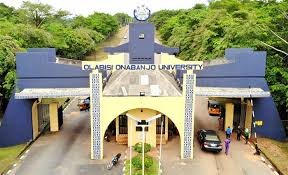A wave of condemnation has trailed a viral video showing female students at Olabisi Onabanjo University (OOU), Ago-Iwoye, Ogun state being physically screened and prevented from sitting for examinations by some invigilators and campus security personnel for allegedly not wearing bras, under what has been dubbed the “OAU no bra no entry” policy.
Many have questioned the university’s priorities at a time when students face far more pressing academic and infrastructural challenges, while others have stated the university is well within its rights to enforce discipline and its code of conduct.
Enforcing The University’s Moral Codes
The controversial enforcement of this rule reportedly took place during the ongoing semester examinations. Some students shared accounts of being subjected to invasive checks. Others were outright denied access to examination halls because they were braless, highlighting how “OAU no bra, no entry” has impacted them.
While the university’s official dress code makes no mention of undergarment requirements, it places a ban on any clothes “capable of making other students lust after the student in an indecent manner”.
The section on indecent dressing in the school’s code of conduct clearly defines indecent dressing. It states “any dressing by any student which shows sensitive parts of the student’s body such as breasts, buttocks, nipples, and belly buttons….”
President of the university’s students’ union, Muizz Olatunji, noted on X that the university promoted “a dress-code policy aimed at maintaining a respectful and distraction-free environment. It encourages students to dress modestly and in line with the institution’s values”. This underscores the ‘OAU no bra no entry’ directive.
He added that the policy was not new. The union had “engaged with the institution to explore alternative approaches to addressing indecent dressing. The focus was on respectful and dignified interactions between students and staff”.
Misplaced Priorities in a University Crying Out for Reform
Those not in agreement with the rule have called it a misplaced priority. They note that the institution, like almost every other public tertiary institution in Nigeria, faces a myriad of pressing issues. These issues are undermining the quality of teaching and learning, overshadowing the ‘OAU no bra no entry’ concerns.
Issues like inadequate infrastructure, outdated teaching, and learning aids exist. In addition to unstable internet connectivity, these difficulties make it hard for students to access digital learning resources. The electricity situation, like every other part of Nigeria, is also unstable at best.
Gender rights advocates have further described the “no bra, no exam” rule as a violation of women’s bodily autonomy. A senior official at campaign group Human Rights Network, Haruna Ayagi, pointed out that students could sue the university for violating their rights under policies like ‘OAU no bra no entry’.
“Unwarranted touches on another person’s body are a violation and could lead to legal action. The university is wrong to adopt this method to curb indecent dressing,” she said, reflecting on the ‘OAU no bra no entry’ policy.
Underlying Economic Challenges
Whilst the moral and legal standpoint is the most visible in the issue, there is an economic undertone. This makes such a directive a stretch. Inflation over the past two years has raised bra prices significantly. Bras that once sold for between N1,000 and N1,500 now cost in the region of N3,000 – N7,000. More sophisticated branded or imported options go for as high as N10,000. Many students are unable to afford these due to their already piling financial obligations, making an ‘OAU no bra no entry’ policy economically burdensome.
As such, insisting on bras as a condition to write examinations might be tantamount to placing unnecessary financial burdens on students, especially amidst the economic hardship being faced by most Nigerians.

